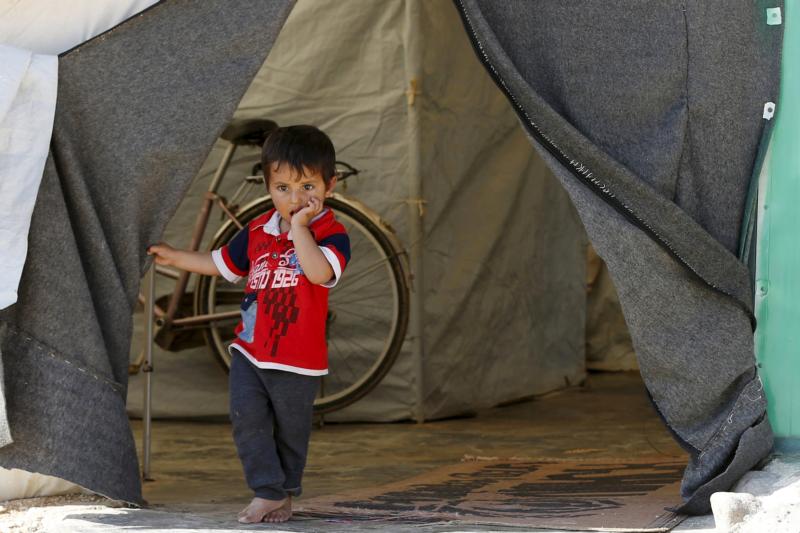
A Syrian refugee boy stands in front of his family’s tent in late November at a camp in the Jordanian city of Mafraq, near the border with Syria. (CNS photo/Muhammad Hamed, Reruters)
by Tom Tracy
WEST PALM BEACH, Fla. (CNS) — The explosive global refugee crisis — likely the top debate-generating news story of 2015 — seems destined to dominate domestic and foreign politics for years to come at a time when Pope Francis has been calling for a compassionate world response.
Early in 2015, Pope Francis again called attention to the plight of mostly Libyan refugees who perish en route to Europe during the Mediterranean Sea crossing to the southern Italian coastal island of Lampedusa. The pope has concluded the year by confirming his intention to visit the Mexico-U.S. border during an anticipated papal visit to Mexico set for February, an action that will likely been seen as provocative by some U.S. lawmakers.
Waves of refugees have been fleeing war-torn Syria for new opportunities in the West. By year’s end a new surge of Central Americans — mainly unaccompanied minors — crossing the U.S.-Mexico border and entering the United States has added to tensions over accepting newcomers into this country.
And deadly terrorist-related shootings this fall in Paris and in San Bernardino, California, have now further strained refugee response initiatives as top politicians such as U.S. President Barack Obama and German Chancellor Angela Merkel are facing heavy criticism and even open resistance to the resettlement of North African and Middle Eastern refugees.
Pope Francis’ U.S. visit in September and his newly inaugurated Year of Mercy for the church worldwide are seen as further teaching moments from the pontiff on the need for mercy and compassion for migrants and refugees.
The number of refugees and internally displaced persons currently in need of protection is the largest since World War II, according to the Washington-based Jesuit Refugee Service/USA, which serves and advocates for the rights of refugees and other forcibly displaced persons.
In 2014, there were almost 60 million refugees and internally displaced people around the globe, according to the U.N. High Commissioner for Refugees.
Past mass migration events — including those prompted by unrest in Southeast Asia, Afghanistan, Colombia and the Balkans — indicate that the current crisis in the Mediterranean and Middle East may be a decade-long affair with an average time a refugee remains displaced at around 15 years, possibly longer, according to Mitzi Schroeder, director for policy for Jesuit Refugee Service/USA.
The agency is currently commemorating its 35th anniversary, looking back on the Indochinese boat and land crisis that led to its founding by Jesuit Father Pedro Arrupe, then superior general of the Society of Jesus.
The experience of responding to that situation led to the establishment of JRS’ triple mission to accompany, serve and advocate on behalf of the forcibly displaced, Schroeder notes.
“As in the present crisis in the Mideast, the flight of refugees from Vietnam, Cambodia and Laos was initially large and chaotic,” she told CNS. “Many died at sea in the process. Many victims of that crisis were never able to return to their homes, nor were offered permanent protection in the neighboring region.
Ultimately, a “Comprehensive Plan of Action” was created to guarantee immediate assistance, temporary protection and permanent resettlement of the Asian refugees to countries like the United States, which responded by taking in over a million people: The present crisis similarly requires a broad international effort to save lives, preserve the human dignity, and find durable solutions, according to Schroeder, who joined JRS in 2003. Currently, she is chair of the protection committee of Refugee Council USA, co-chair of the Humanitarian Partnerships Working Group of InterAction and co-chair of the UNHCR-NGO Urban Refugees Task Team.
The sheer size of the current refugee crisis, the difficulty in reaching suffering people within Syria because of ongoing war, and the public perception that terrorists are hiding among the refugees moving to neighboring countries, Europe and the United States multiplies the difficulty in addressing the situation.
Anti-Muslim backlash and pushback to resettling Syrian refugees in particular has resulted in local dioceses and even parishes having to respond to local parishioners who express no desire to see more Middle East refugees resettled in their community for fear of harboring terrorists.
JRS believes that those refugees who pass the U.S. screening applied to Middle Eastern asylum seekers who are chosen for their persecution and vulnerability to further harm are very unlikely to constitute a threat to the country, according to Schroeder. Syrians and other refugees seeking entry for purposes of resettlement are subject to the most rigorous security screening of any group entering the United States, she added.
“This screening extends the time they must wait for resettlement to as much as two years,” Schroeder said, noting that the situation of refugees flooding unscreened into Europe in a “self-selected” fashion does include many risks that would necessarily not be in play in the U.S.
One silver lining in the crisis is that a greater awareness of the Syrian meltdown has caused the most stress on neighboring countries in the region and those countries need continued refugee response support from the rest of the world. The Syrian refugees in particular are now facing a fifth winter without adequate food, shelter, heat, medical care or access to education for their children.
“The international community has not been willing or able to come up with the resources needed to support the growing displaced population adequately. How they would support a vastly increased number of people in so called ‘safe zones’ within Syria, given cost plus the additional logistical efforts that would entail, I do not know,” Schroeder said in response to calls for keeping the Syrian refugees closer to home instead of resettling them in Europe and the West.
In addition, Schroeder said the legal implications of establishing such a zone and the military costs and dangers — especially given the involvement of Russia in the situation — would have to be very seriously considered.
“Safe havens have not worked very well in the past. If the intent is to “contain” people who have a right to flee under international law, this would be totally unacceptable,” she added.
Meanwhile, one of the most pressing needs of Middle East refugees, both in acute crises and in protracted situations like Syria, is for education.
“Refugees can languish for a generation without the ability to rebuild their lives. It is tragic that during this period refugee children and youth too often do not have access to education which can sustain hope and provide the tools necessary for them to grow and thrive as individuals and as a community,” Schroeder said.
As an initiative of the “Year of Mercy,” Pope Francis has asked JRS to launch a new initiative that will almost double the agency’s present education programs by providing educational opportunities to an additional 100,000 refugees a year.
JRS already has begun a new effort to increase awareness of the issue of refugee education, and to raise the resources needed to reach that goal. And even the enormous Syrian crisis cannot be allowed to divert full attention to other international refugee problems affecting other populations including the Rohingya of Myanmar, South Sudanese, the people of the Central African Republic, and the displaced children of Central America and others, Schroeder noted.
“The U.S. resettlement program has been one of the most successful means of protection of refugees ever created, and has brought new life opportunities to some three million people since its inception, people who are now our friends, neighbors, family members, and fellow citizens. We should be very proud of this,” Schroeder said.






